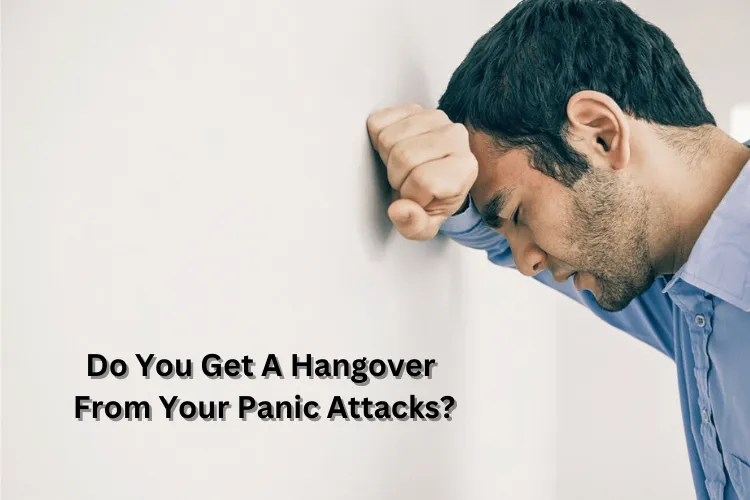Do You Get A Hangover From Your Panic Attacks?

Life is a mixture of cloudy, gloomy days and bright, colorful days with rainbows. The number of situations one faces as a result of a difficult and unpredictable situation activates the wheel of thinking in a constant loop. Going back and forth about an activity or event based on the future may make you feel the need to control the outcome during the waiting period and anticipation of it.
Do you ever feel the burden of something that is yet to happen? Do you find yourself obsessing over an upcoming event or activity? If you can relate to these questions, then probably you do know how it feels when your mind is racing with all the possibilities of a particular event.
How does a panic attack happen?
Panic attacks are temporary periods of acute terror and discomfort characterized by palpitations, sweating, chest pain or discomfort, shortness of breath, shaking, disorientation, numbness, forgetfulness, or a sensation of imminent doom or loss of control. People of all ages and walks of life are susceptible to panic attacks. Research has proven that women are twice as likely to have a panic disorder compared to men. The underlying factors behind why people experience panic attacks have not been clearly understood by researchers. However, the brain and nervous system play a key role in how you perceive and handle fear and anxiety. You are more likely to experience one if you happen to have a family history concerning mental health and substance abuse issues. You have to always remember that help is available at every step of the way and that you are not alone!
Panic attacks need immediate attention. The wellness experts at Ganeshaspeaks.com can help you with breathing and grounding techniques to deal with your panic attacks. Download the app now.
What causes a panic attack hangover?
Panic attacks and anxiety attacks are not interchangeable terms. A panic attack is a sudden episode of extreme fear that causes severe physical symptoms such as chest pain, shortness of breath, and nausea despite the fact that there is no real danger. The term “hangover” refers to the physical and emotional aftereffects of an intense panic attack. Adrenaline levels in the body rapidly skyrocket during a panic attack, resulting in sharper reflexes, greater energy and awareness, and the body’s readiness to flee for safety or fight for life.
Symptoms of a panic attack hangover
Feeling drained out and experiencing low energy throughout the day followed by a panic attack is a completely normal response that your body can have. You may notice certain symptoms if you are experiencing a post-panic attack, also known as a panic attack hangover.
- Fatigue
- Body aches and pain
- Excessive sweating & a racing heart
- Chills
- Dizziness and chest pain or discomfort
- Soreness in the jaw
How can one deal with a panic-attack hangover?
There are treatments available to improve your discomfort. “Do something engaging but not very hard,” Dr. Rosmarin advises. He recommends going for a stroll or a mild jog, watching an interesting movie, or having a conversation. If you’ve been intending to complete a modest organizing or do-it-yourself project, now is the moment.
- Grounding techniques work like a charm whenever you have a panic attack or a hangover. It is the quickest way to bring yourself back to reality and feel better.
- Changing your physical position: If you’re feeling panicky or anxious or your body is reacting abnormally to something, you may need to physically comfort it. This involves shifting your bodily position; for instance, if you’re standing or pacing, sit somewhere to relax and counteract that reaction.
- Connect with a loved one: If you feel comfortable enough to vent, it is possible to contact someone you trust with your feelings and emotions.
- Exercise: Keep in mind that some symptoms, including restlessness, can persist after an anxiety attack. You may need to move around or engage in exercise to help your body adapt to the decline in adrenaline. Endorphins are released, stress is reduced, and mood is lifted by doing this.
- Change your environment: Did you just experience a panic attack in your bedroom? Walk outside. Have you ever had a panic attack in a crowd? Go somewhere where you can be alone to relax.
- Devour something: While eating should not always be your go-to panic-attack remedy, a tiny snack or treat might help put your mind at peace. If you’re craving sugar, consider having a sweet yet nutritious snack, such as fruit or mixed nuts. Anxiety attacks may be exhausting, so it is critical for you not to disregard basic necessities like eating.
- Therapy: Consider going to therapy and finding the root cause of your ongoing anxiety or developing coping strategies to help with the intensity of panic attacks, then accepting them and learning to manage them in the long run.
“Instead of worrying about what you cannot control, shift your energy to what you can create.”
— Roy Bennett
Talk or chat with therapists and counselors at Ganeshaspeaks.com by downloading the app.










